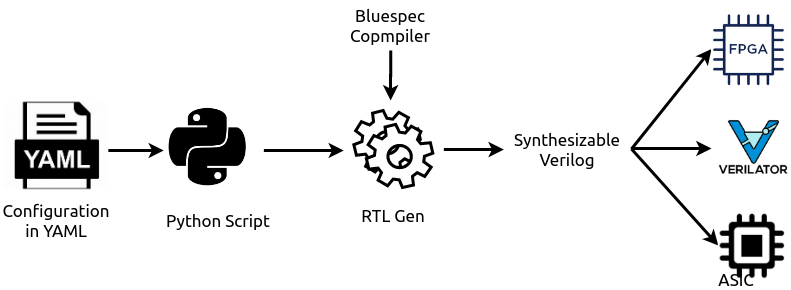1. Overview¶
Chromite is an open-source core generator, which emits synthesizable, production quality RTL of processors based on the open RISC-V ISA. The core generator can produce variants of a commercial grade 5-stage in-order core supporting the RV[64/32]GCSUN (or its subsets) extensions of the RISC-V ISA, from the same high-level source code. Chromite leverages the high level abstraction offered by Bluespec System Verilog to build highly parameterized, compact and powerful library components (like arithmetic units, branch predictors, caches, mmu, etc) that can be seamlessly integrated to create a solution catered to your needs.
The configuration to the generator is provided through a very simple and easy to modify YAML file. The core generator uses a python script to generate the necessary environment variables and macros required to generate the RTL. The generated RTL is completely synthesizable and can be directly integrated into conventional VLSI flows for FPGA, ASIC or verification. Fig. 1.1 shows the basic flow of the Chromite core generator.

Fig. 1.1 Chromite Core Generator Flow¶
The various design instances generated through Chromite can serve domains ranging from embedded systems, motor-control, IoT, storage, industrial applications, all the way to low-cost, high-performance Linux based applications such as networking, gateways etc. The extreme parameterization of the design in conjunction with using an HLS like Bluespec, it makes it easy to add new features and design points on a continual basis.
1.1. Feature list¶
6 stage in-order pipeline
64/32-bit variants available
Configurable to support the following RISC-V ISA extensions: RV[64/32][IMAFDCSUN]
Supports IEEE-754 based single and double precision Floating Point operations in hardware. These units can be configured to meet high-frequency requirements
Integrated integer Multiply/Divide units
A flexible Co-processor interface to provide closely-coupled integration of custom accelerators.
Supports AXI-4, AXI-4 Lite and TileLink bus protocols
Configurable L1 Caches
Separate instruction and data caches which can be configured with upto 4-ways and 32KiB
Optional ECC support for RAMs
Write-back with Write-allocate caches
Virtually indexed and physically tagged
Can be configured to be used as RAMs during run-time
Optimized to use single-ported RAMs
Can be disabled/enabled through software
Configurable replacement policies: Pseudo LRU, Random, Round-Robin
Configurable Memory Management Unit (MMU)
Fully-associative and separate instruction and data TLBs with upto 16 entries
Supports variable page sizes. 4KiB and 4MiB pages for 32-bit core. 4Kib, 2MiB, 1GiB and 512GiB pages for 64-bit cores
Physical Memory Protection Unit (PMP):
Configurable number of regions : upto 16 can be protected.
Can protect upto a granularity of 4 bytes for the 32-bit core and 8 bytes for the 64-bit core.
Certain regions can be locked for protection against machine level access as well
Branch Prediction (BPU):
Supports Gshare based branch prediction scheme
Fully-associative Branch Target Buffer with upto 64-entries
Variable size Branch History Buffer
Configurable size of Return Address Stack
Ability to disable predictor at runtime through software
Daisy Chained CSRs optimized for frequency and scaling
Allows adding of custom CSRs without having to compromise on frequency
Can instantiate up to 32 performance counters
Debug support based on the RISC-V Debug spec v0.14
Trigger support for data and address.